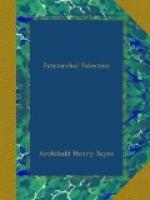It is only since the discovery and decipherment of the cuneiform tablets of Tel el-Amarna that the story of Melchizedek has been illustrated and explained. Hitherto it had seemed to stand alone. The critics, in the superiority of their knowledge, had refused credit to it, and had denied that the name even of Jerusalem or Salem was known before the age of David. But the monuments have come to our help, and have shown that it is the critics and not the Biblical writer who have been in error.
Several of the most interesting of the Tel el-Amarna letters were written to the Pharaoh Amenophis iv. Khu-n-Aten by Ebed-Tob the king of Jerusalem. Not only is the name of Uru-salim or Jerusalem the only one in use, the city itself is already one of the most important fortresses of Canaan. It was the capital of a large district which extended southwards as far as Keilah and Karmel of Judah. It commanded the approach to the vale of Siddim, and in one of his letters Ebed-Tob speaks of having repaired the royal roads not only in the mountains, but also in the kikar or “plain” of Jordan (Gen. xiii. 10). The possession of Jerusalem was eagerly coveted by the enemies of Ebed-Tob, whom he calls also the enemies of the Egyptian king.
Now Ebed-Tob declares time after time that he is not an Egyptian governor, but a tributary ally and vassal of the Pharaoh, and that he had received his royal power, not by inheritance from his father or mother, but through the arm (or oracle) of “the Mighty King.” As “the Mighty King” is distinguished from the “great King” of Egypt, we must see in him the god worshipped by Ebed-Tob, the “Most High God” of Melchizedek, and the prototype of “the Mighty God” of Isaiah. It is this same mighty king, Ebed-Tob assures the Pharaoh in another letter, who will overthrow the navies of Babylonia and Aram-Naharaim.
Here, then, as late as the fifteenth century before our era we have a king of Jerusalem who owes his royal dignity to his god. He is, in fact, a priest as well as a king. His throne has not descended to him by inheritance; so far as his kingly office is concerned, he is like Melchizedek, without father and without mother. Between Ebed-Tob and Melchizedek there is more than analogy; there is a striking and unexpected resemblance. The description given of him by Ebed-Tob explains what has puzzled us so long in the person of Melchizedek.
The origin of the name of Jerusalem also is now cleared up. It was no invention of the age of David; on the contrary, it goes back to the period of Babylonian intercourse with Canaan. It is written in the cuneiform documents Uru-Salim, “the city of Salim,” the god of peace. One of the lexical tablets from the library of Nineveh has long ago informed us that in one of the languages known to the Babylonians uru was the equivalent of the Babylonian alu, “a city,” and we now know that this language was that of Canaan. It would even seem that the




